![[safe]](safe.gif)

The Thin Red Line
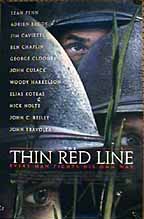
Starring Sean Penn, Elias Koteas, Nick Nolte, Jim Caviezel, Ben Chaplin,
Jared Leto, Dash Mihok, Adrien Brody, John Cusack, Woody Harrelson,
John Travolta, George Clooney, John C Reilly
Directed by Terrence Malick
![[safe]](safe.gif)


If there is any justice at all, Terrence Malick’s "The Thin Red Line" will be remembered as 1998’s better World War II film. So far, the Hollywood Foreign Press Association has officially snubbed the film in the Golden Globe Awards (but since they once gave Pia Zadora an acting award, their credibility and judgment is forever suspect), but with any luck, this much worthier, personal film will find the audience it so richly deserves.

Although Steven Spielberg’s "Saving Private Ryan" was a powerful epic which managed to grab Summer audiences, it pales in comparison to Malick’s long-awaited return to film-making. After an absence of twenty years, he proves that the time away has been a loss for film audiences everywhere who’ve been denied more of his distinctive style of film-making.
The film largely concerns a company of men under the command of Staros (Elias Koteas) and Tall (Nick Nolte), who don’t see eye-to-eye on matters, and their efforts to capture a Japanese stronghold. However, Malick concentrates on the minds and hearts of his men, rather than their valours, and delivers a film that meanders through a host of characters in order to reach its haunting conclusion.
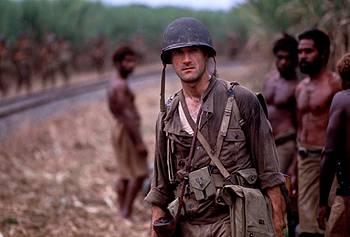
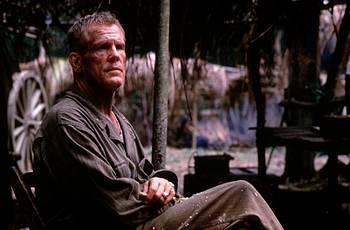
Early reviews and reactions to "The Thin Red Line" have been mixed. Many applaud the hypnotic and mesmerizing imagery presented, the dense characterizations and the slow, meditative feel of the film, but cite the fragmented plot, the lack of a linear narrative and the confusing voice-overs as reasons for disgruntlement. These criticisms, though true, when put in proper perspective prove to be assets to the film.
Based on James Jones’ semi-autobiographical novel, Malick’s script doesn’t so much present a story with a beginning, middle and end, as it portrays a mood, a feel that draws the audience in. The lack of a "plot" is inconsequential because Malick’s point in making the film is not to tell a typical story (unlike Spielberg’s "Saving Private Ryan"), but rather, it aims involve the audience emotionally without resorting to presenting any ideals nor cheap manipulation.
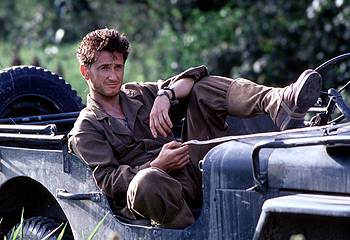 It is revealing that whereas the battle scenes in "Ryan" were the highlights and only
talking-points of the film, bookending the weak, by-the-numbers story in between, the scattered
skimishes that dot "Line" are presented in a matter-of-fact manner - Malick is not using the
horror of war to sell his film. There is nothing sensational nor voyueristic in his approach.
His theme of destruction and survival in life is not confined to using jolt tactics to compel
his audience to watch.
It is revealing that whereas the battle scenes in "Ryan" were the highlights and only
talking-points of the film, bookending the weak, by-the-numbers story in between, the scattered
skimishes that dot "Line" are presented in a matter-of-fact manner - Malick is not using the
horror of war to sell his film. There is nothing sensational nor voyueristic in his approach.
His theme of destruction and survival in life is not confined to using jolt tactics to compel
his audience to watch.
And instead of introducing a handful of characters, giving each one a "moment" to tell his story, and then routinely killing them off to elicit audience sympathy, Malick’s huge cast of characters seem to blend and merge into one - the physical resemblance between some of the cast members, notably John Cusack and Elias Koteas, Jim Caviezel and Ben Chaplin, helps heighten the running theme that Malick’s film is about every man as an individual. This universality of view point thus renders the confusion about voice-overs a nullity, since it doesn’t matter who’s talking, it’s what he’s saying that counts.
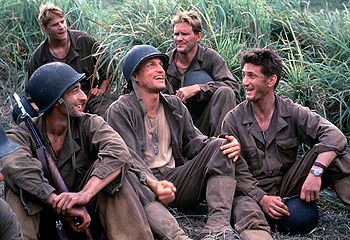 The cast who clamoured to appear in this film perform well, although some of the big names -
Clooney, Travolta - who make cameo appearances are distracting rather than effective. Sean
Penn, again confirming that he may be the best actor of his generation, gives a stunning
portrait in a handful of scenes. Elias Koteas, who’s come a long way since "Some Kind of
Wonderful", continues to do brilliant character work. Ben Chaplin - affecting a convincing
American accent - is memorable as the love-sick Bell. His doppleganger, Jim Caviezel, is given
a great opportunity to play a multi-layered character and leaves a lasting impression.
The cast who clamoured to appear in this film perform well, although some of the big names -
Clooney, Travolta - who make cameo appearances are distracting rather than effective. Sean
Penn, again confirming that he may be the best actor of his generation, gives a stunning
portrait in a handful of scenes. Elias Koteas, who’s come a long way since "Some Kind of
Wonderful", continues to do brilliant character work. Ben Chaplin - affecting a convincing
American accent - is memorable as the love-sick Bell. His doppleganger, Jim Caviezel, is given
a great opportunity to play a multi-layered character and leaves a lasting impression.
Good as they are, all take a back seat to Malick. Masterful as always, it seems nary a day has
passed since his awesome debut in "Badlands" (which was ruthlessly plundered in Tarantino’s
script for "True Romance"). "The Thin Red Line" is an absorbing, involving work which
challenges its audience by demanding that they invest time and concentration - those willing to
do so are guaranteed a film they won’t soon - or perhaps, ever - forget.